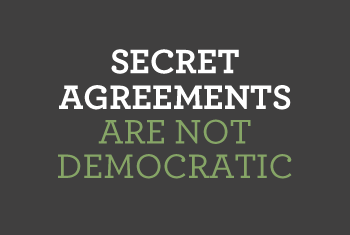 Trick question. Any TPPA would be crap. But a future government will try to sell it to us anyway. It is clear that there won’t be any deal until well after the election and the new government is installed. So where will the parties and potential coalition partners line up?
Trick question. Any TPPA would be crap. But a future government will try to sell it to us anyway. It is clear that there won’t be any deal until well after the election and the new government is installed. So where will the parties and potential coalition partners line up?
We know where the Nats stand. Expect Groser to sign up to a deal irrespective of how crap it is. He and Key have been sending mixed messages, presumably to cover all their options. On one hand Key insists that Japan must make a total surrender (although he never demands the same from the US). At the same time Groser is trying to dampen expectations, knowing that Japan and the US will deliver diddly squat to NZ and extract a high price in return.
Few of their colleagues would have a clue about what a finalised TPPA actually said. After all, blind trust is much easier than getting bogged down in the gritty details.
Then they’d spin it for all it’s worth (not much): NZ’s isn’t looking for immediate gains; we’re for the long-term; the real return will come when the big players join, especially South Korea and ultimately China; NZ can’t afford to be left behind.
And pigs might fly. But provided a deal was struck in the first two years of a new government, National would assume there would be no political come back. Even if there were political risks, Groser would want to do it anyway. Voters have short-term memories and other priorities.
What about National’s current coalition partners, whoever remains in the running? Peter Dunne is a long-time advocate of free trade and will continue to turn a deaf ear to his constituents and others who point out the contradictions with his own policies. ACT will go with a TPPA, even though it has argued against the executive’s treaty making power in the past. The Maori Party has been strong in its criticism over the past year, but it is not going to squander what minimal leverage it might have on trying to block the TPPA. As for Colin Craig – has he ever heard of the TPPA?
Would NZ First make the TPPA a red line with whichever party, assuming they hit the threshold? Winston has asked some highly critical questions in the House on the TPPA, but has not made it a major issue outside. His deputy, Tracey Martin has made a great speech at the politicos’ press conference late last year about secrecy, democracy and national sovereignty.
It would be nice to rely on Winston, especially as none of his policies would be deliverable under a TPPA. But I remember how a once-staunch opponent of the multilateral agreement on investment (MAI) in the late 1990s was suddenly besties with Condi Rice once he became foreign minister as part of the Labour-led government.
Labour is captive of a fundamental contradiction. So many of its policies would be threatened under a TPPA, especially by investor-state disputes. But anyone who heard David Shearer on Insight several weeks ago channel the same uncritical line as Phil Goff know that Labour’s old guard would reject a TPPA over their dead bodies.
Whichever party is in power, Goff and Shearer are likely to retain the crucial portfolios of overseas trade and foreign affairs. If in government, they will be as desperate as Groser to sign a deal. In opposition they would likely remain Labour’s members on the foreign affairs, defence and trade select committee that would consider any agreement.
Could the Greens force Labour into a corner? Yes they could, and the growing share of the traditional left vote now occupied by the Greens will prove critical. Again, they had been staunchly critical of the process and substance of the TPPA. Yet Russel Norman was equivocal when asked on TV3’s The Nation in March whether the TPPA would be a red line for the Greens. They sure could do with some help drawing that red line.
That leaves Internet MANA. Both constituent parts have been implacably opposed to the TPPA.
Not a pretty picture, unless people make it clear that there is a high political price of supporting any TPPA. Base lines should include: release of the draft texts now; reject the right of investors to sue; no changes to New Zealand’s existing IT and pharmaceuticals regimes; rights to re-regulate financial markets, foreign investment and capital flows; priority to public health and other public services over foreign commercial interests; protection of data privacy; Buy Kiwi at central and local government level; among many others.
Achieving that means making the TPPA an election issue at every opportunity – candidates meetings, political debates, letters to the editor, talkback and other media. Vocal constituencies are the backbone of most parties, from Grey Power, trade unions and tangata whenua to local businesses and the IT community.
Above all, bring these politics back into the smoko room (without the smokes) and the dinner table, and make this election about policies that matter, not the sideshows the mainstream media is peddling.
The failsafe option for the TPPA is to prevent the negotiations reaching a conclusion. That, too, depends on keeping the political price of capitulation too high. More on that next time.







Good on you Jane.
The secrecy about the real content of the TPPA is the huge alarm bell here.
The secrecy, and the lack of media about something so very important for NZers to be aware of!
ALL political parties must come clean on their views and plans for this.
opinion.
The exemplary professor reckons…”Whichever party is in power, Goff and Shearer are likely to retain the crucial portfolios of overseas trade and foreign affairs. If in government, they will be as desperate as Groser to sign a deal.”
Is it naive of me to ask “why”‘, when it seems so obvious that we shouldn’t be touching the thing with a ten foot barge pole never mind signing our names to it?
This issue is the main reason I have no intention of Labour having my party vote in this next general election.
A Labour government could bring it in with National’s support if their own coalition partners were opposed.
That’s a chilling thought, Mikesh.
http://www.democracynow.org/blog/2014/7/17/web_special_joseph_stiglitz_on_tpp
There are two kinds of NZ politicians . Dead ones and those who constantly circle the smell of money in the water .
If the infection that is the TPP can be carried off ? Well , then them Good Old Boys will be all a woopin’ and a hollerin’ and shootin’ their six guns while banking the salaries we pay ‘ em . Yee haw !
Here’s a thing .
If a NZ Government , once elected , kicked out the banks , defaulted on off-shore loans , wrote off mortgage debt , put a withholding tax in place , introduced a four day working week while doubling the minimum wage , pulled the plug on previous arrangements to sell our assets , made electricity free to all domestic consumers , rebuilt our sabotaged passenger rail service , provided huge incentives for the poorer city people to live in the country towns and with help , become cottage farmers and develop small industry , create a Ministry of Culture and Elegance and have a traveling road show of Art and Beauty and create a new public holiday called ‘ Burn all your Polypropylenes Day ‘ , I’d be secure in the knowledge that those who promote the TPP would just fuck off to play with their little diddles and leave us human beings alone .
And if you think the above is absurd ? Think again . Absolutely do-able in fact .
Not a bad list, but you dont say how to fund it. I can only assume that you must have a PositiveMoney/ Social credit type of monetary system in mind. If so, you can add Guaranteed Minimum Income, Financial transactions tax, and no GST.
And the Yanks would park the south pacific fleet off our doorstep and kill any leftist that raised their collective heads. They would spin a line about how terrorist have taken over NZ and install John Key as president till things settled down. Unless this shit, called neo-liberalism is stopped in many countries, it will just grind down anybody who gets in it’s way. And god knows we’d be in the way, if we did what you proposed countryboy.
re . “Base lines should include: release of the draft texts now ” does the Government have in their hands the full draft or are they as in the dark as the rest of the country ,ie. relies on Wikileaks ?
re . “reject the right of investors to sue; ” ,isn’t this a key feature for those driving the TPPA coup ?
re . “no changes to New Zealand’s existing IT and pharmaceuticals regimes ” same as above.
re . “rights to re-regulate financial markets, foreign investment and capital flows” same as above.
re . “priority to public health and other public services over foreign commercial interests” same as above.
re . “protection of data privacy” same as above.
re . “Buy Kiwi at central and local government level” sorry ,same as above.
So in essence ,the unlaying premise of the TPPA is the very reason we should avoid signing it at all ?
So our only choice is Greens and Internet Mana or a transnational corporate take over of our ability to self govern ?
[…] https://thedailyblog.co.nz/2014/07/23/which-party-would-not-walk-away-from-a-crap-tppa […]
Watching wider news sources (i.e not the MSM) leads me to believe that “larger players such as China” will NOT join the TPPA. We are headed down the road to trade blocks, the TPPA (mirrored by a trans Atlantic equivalent) represents an American attempt to control trade on their terms. China will probably feel that their interests are more with BRICS. After all, when the US owes you a fortune and they then try to dictate terms the obvious Chinese answer is to tell them where to go.
For NZ the issue is very dangerous: any political deviation from Washington’s will could result in a “Whitlam”. Interesting times.
You’re right; it is dangerous but if there can be no signing before the election, and if USA congress itself might reject it, it should be possible for the left to run in this election on a platform of rejecting the TPP. If it won and had a clear mandate, I dont see that the USA could do much without looking every bit the monster that it is.
New Zealand First opposes the Trans Pacific Partnership Agreement. The level of secrecy and the refusal to show the text of the agreement, means that the public is entitled to be suspicious. Questions about its impact on our national sovereignty and whether or not Pharmac would still be able to work effectively are also raised.
I’m sure it’s not going to win them any votes here, but for what it’s worth I thought I’d add to the mix that the Conservative party has in fact put out a press release on the TPPA, and it does place them on the democratic side of this debate:
http://www.scoop.co.nz/stories/PO1212/S00312/conservative-party-tppa-lack-of-transparency-is-concerning.htm
This is not intended as an endorsement of that party, and I’d sooner cut off my face than recommend you vote for climate change and/or moon landing sceptics.
Anything done behind closed doors is always something to worry about and I fully support those parties that will follow a fair and transparent process.
New Zealand First opposes the Trans Pacific Partnership Agreement. The level of secrecy and the refusal to show the text of the agreement, means that the public is entitled to be suspicious. – See more at: https://thedailyblog.co.nz/2014/07/23/which-party-would-not-walk-away-from-a-crap-tppa/#sthash.TBablye8.dpuf
Labour Greens NZ First, & Internet party all could all unite and run on the NO VOTE TPPA Platform without first ratifying it with clear loopback public partnership input first.
Then order a referendum.
This would make the Opposition looking like a real true democracy at work, whereas National will be seen as the draconian animal it really is.
This may grow to be an election plank, and a clear way for a potential interest by voters for a rise in voter preference.
That way the opposition get a bob each way, while the voters will see a clear attempt has been made by the opposition to have an open transparent process first before signing onto a monster lie a TPPA.
Come on opposition parties what have you and us got to loose?
As always, these propositions tend to start climbing at the top of the ladder, but assuming that we are incapable of ridding ourselves of party politics and returning to honest regional representation, the principle problems with this scenario are:
the leeway it provides corporate entities to invade national environments regardless of localised legislation
the imposition of failed models of intellectual property law into environments that have (slightly) better models already working.
the failure of mature aged people to understand that it is only thieves that require obscurity within which to act, and demand full details and national referendum action before any decision process is entered into.
Comments are closed.